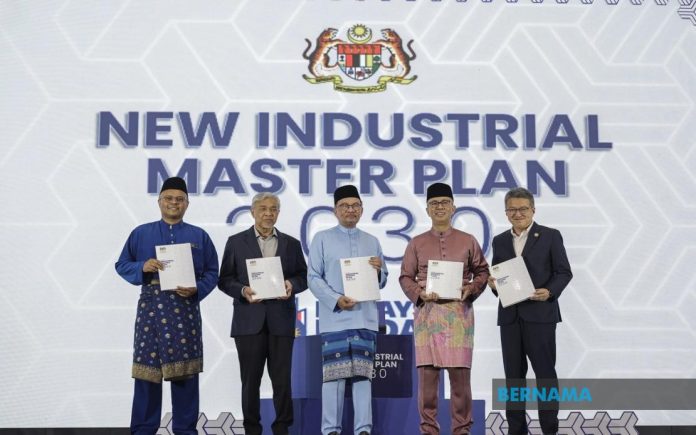Prime Minister Datuk Seri Anwar Ibrahim today unveiled the New Industrial Master Plan (NIMP) 2030 which outlines specific plans to ensure the growth of local small and medium enterprises (SMEs) and improve the livelihood of Malaysians. Datuk Seri Anwar Ibrahim said that the government’s Madani Economy framework and NIMP 2030 were both aligned in their focus to improve lives through projected higher returns from national economic targets. “This includes employment with meaningful wages and wealth-sharing to build a more equitable and prosperous society,” he said at the launch in Kuala Lumpur.
NIMP 2030 outlines Putrajaya’s plans to transform Malaysia into a high-tech industrialised nation. Datuk Seri Anwar said it would require total investments of RM95bil, funded predominantly from the private sector from private equity, capital and financial markets. “Close to 10% will be allocated by the government to catalyse and help incentivise these investments via the NIMP Industrial Development Fund and the NIMP Strategic Co-investment fund,” he added. The Prime Minister said it was crucial to create high-value job opportunities to uplift and expand the middle class. This was because global trends such as the rising role of Industry 4.0 technologies, climate change and sustainability practices, demographic shifts and globalisation of value chains are changing the nature of jobs, he added. “Skills transformation is key to develop future competencies and this has been set as a focus of our industrial strategy,” he said.
Anwar said NIMP 2030 aims to increase manufacturing’s value to RM587.5bil by 2030, which is a growth of 6.5% from the present figure. “This indicates an increase of 61% derived by NIMP 2030 interventions for high-impact sectors – E&E, chemicals, EV, aerospace, pharmaceuticals and advanced materials such as minerals and metals,” said Anwar. NIMP 2030 would see a projected growth at 2.3% in employment from this year to provide a livelihood for 3.3 million people by 2030. “The industry’s growing employment trajectory is due to the creation of high-skilled jobs as the country advances towards higher value-added activities and improvements in automation and technological advancements. “Most importantly, the median salary for the manufacturing sector is expected to grow by 9.6% to reach RM4,510 from RM1,976, which is below the national average despite the sector’s dominant role in the national GDP. “This 128% increase from 2023 is driven by the shift of the industry towards higher value-added activities and high-skilled job opportunities created,” said Anwar.





















